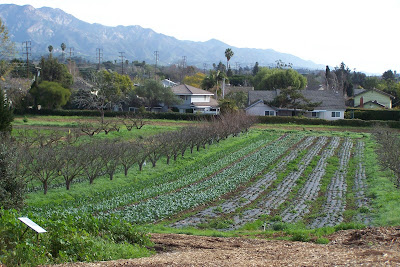We're concluding the podcast series from Fairview Gardens Organic Farm, near Santa Barbara, CA. I visited the farm on January 25 to conduct interviews and take pictures. If you missed the earlier posts and podcasts, I hope you'll have a look back. Fairview is a 12 acre remnant of farmland in a suburban tract. The farm also works an additional 11 acres on another site.
Suburban tractors do tillage, turn compost and form planting beds (Click to enlarge)
Fairview is on a coastal plain below the Santa Ynez Mountains near Santa Barbara. The area was developed with houses in the 1960's and 70's. In that era, the farm was already organic. It is now one of the oldest organic farm operations in California.Even in January, the farm greenhouse is active with starts for the next rotation. Year round cropping is a challenge for the crew and the management of production. And there is no freeze to kill weeds or pests.
Jen and Toby in the greenhouse. In the podcast you'll hear Jen talk about her experience on the farm as an aspiring farmer and what she learns from walking the farm. Farm manager Toby talks about working with a crew that has been farming the same small acreage for 20 years. The crew at this farm knows the soil and growing conditions in every "micro zone" of the farm. This intimate connection with the soil is re-enforced in every day, hands-on operation.
Toby McPartland talked to me about his ideas for operating Fairview Gardens as a small farm business. His thinking includes ways to establish an economic niche for small farms in local communities. He's also looking at ways to involve the community in feeding itself.
I really appreciated having a talk with this young farmer who is finding innovative ways to re-integrate small agriculture into our community.
CLICK - HEAR TODAY'S PODCAST
























